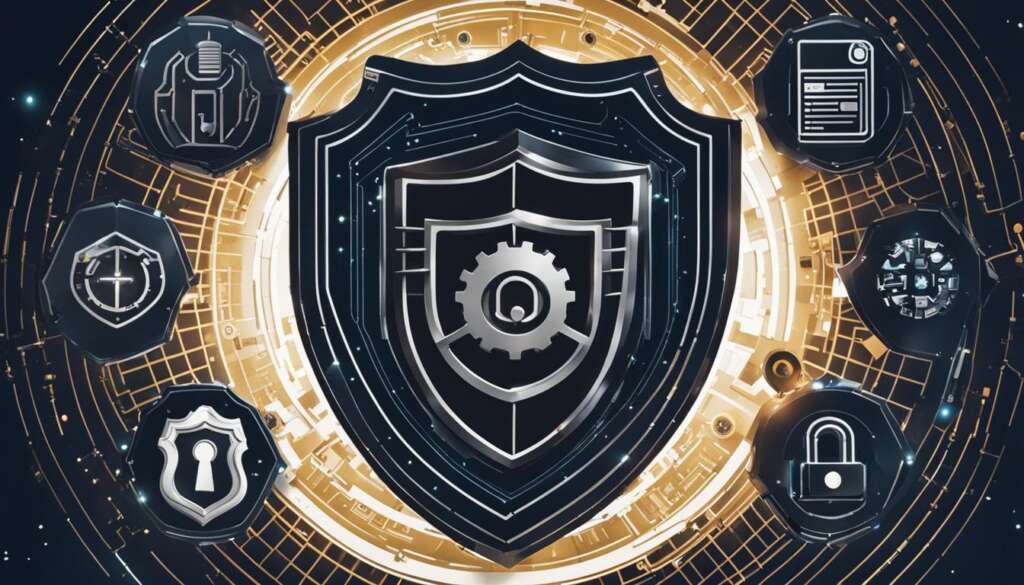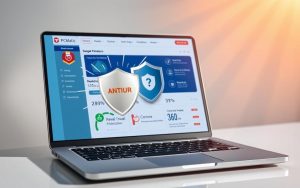Table of Contents
Welcome to our article series on cybersecurity for freelancers. As the freelance industry continues to grow, it is essential for both freelancers and companies to prioritize cybersecurity to protect sensitive data and mitigate risks. In this series, we will provide valuable tips and best practices to help freelancers maintain a secure working environment.
With 73.3 million freelancers in the U.S. alone, it’s clear that the freelance industry is thriving. However, the nature of remote work presents unique challenges when it comes to cybersecurity. Freelancers often have access to sensitive company data, making it crucial to implement proper security measures.
In this first section, we will explore the risks involved in working with freelancers and subcontractors. We will highlight the importance of education and training for freelancers, as well as the significance of proper onboarding and offboarding management. Additionally, we will discuss the advantages of hiring freelance cybersecurity experts and the importance of clarity and data management at the company level.
The Risks of Working with Freelancers and Subcontractors
When businesses outsource work to freelancers and subcontractors, they expose themselves to various cybersecurity risks. One of the main concerns is the sharing of access to systems, such as Content Management Systems (CMS) or control panels. This can pose a significant risk if employees resort to insecure methods of sharing passwords, such as email or text messages. The lack of proper management of account access also creates security gaps, as freelancers may be granted more access than necessary.
To mitigate these risks, it is crucial for companies to implement best practices in freelancer cybersecurity. This includes using secure methods for sharing passwords, such as encrypted password managers or secure file-sharing platforms. It is also essential to follow the principle of least privilege, ensuring that freelancers only have access to the systems, applications, and files required for their specific tasks.
“Companies must be proactive in setting up secure communication channels and providing clear guidelines on how to handle sensitive information.”
Companies must be proactive in setting up secure communication channels and providing clear guidelines on how to handle sensitive information. This can be achieved through proper education and training for freelancers on cybersecurity best practices. Freelancers should be aware of the risks associated with insecure password sharing and be provided with the necessary tools and knowledge to protect company data.
Table: Risks of Working with Freelancers and Subcontractors
| Risk | Description | Best Practice |
|---|---|---|
| 1. Insecure password sharing | Freelancers and employees sharing passwords through insecure methods like email or text messages. | Implement encrypted password managers or secure file-sharing platforms for password sharing. |
| 2. Overgranting of access privileges | Freelancers being granted more access than necessary, creating security gaps. | Follow the principle of least privilege, granting freelancers access only to the systems, applications, and files they require. |
| 3. Lack of cybersecurity awareness | Freelancers lacking proper knowledge and training on cybersecurity best practices. | Provide thorough education and training for freelancers on cybersecurity risks and best practices. |
By addressing these risks and implementing appropriate cybersecurity measures, businesses can better protect their data when working with freelancers and subcontractors. The freelancing industry offers flexibility and diverse skill sets, but without proper security protocols in place, companies may expose themselves to unnecessary vulnerabilities. It is essential for organizations to prioritize cybersecurity and ensure that freelancers are well-informed and equipped to handle sensitive information.
Education and Training for Freelancers
In order to ensure the cybersecurity of freelance workers, it is imperative that they receive proper education and training. Just like traditional employees, freelancers should be equipped with the necessary skills and knowledge to protect sensitive data and mitigate potential cyber threats. By providing freelancers with cybersecurity training, companies can foster a culture of security awareness and ensure that freelancers are aware of the company’s cybersecurity protocols.
One effective way to enhance the cybersecurity skills of freelancers is by incorporating a business password manager into their workflow. A business password manager enables secure password sharing and eliminates the need for freelancers to remember multiple passwords. With the ability to revoke access and manage permissions, companies can ensure that freelancers only have access to the systems, applications, and files necessary to perform their job.
Additionally, companies should follow the principle of least privilege when granting access to freelancers. This principle entails giving freelancers the minimum amount of access required to complete their tasks. By limiting their access to sensitive data, companies can minimize the risk of data breaches and unauthorized access. It is essential for companies to regularly review and update access privileges to ensure that freelancers’ access aligns with their ongoing projects.
Benefits of Cybersecurity Tools for Freelancers:
- Enhanced password security with features such as secure password generation
- Efficient management of multiple credentials through a centralized platform
- Improved productivity by eliminating the need to remember and retrieve passwords
- Streamlined access control with the ability to grant and revoke permissions
- Minimized risk of data breaches and unauthorized access
By prioritizing education, training, and the use of cybersecurity tools, companies can ensure the protection of their data when working with freelancers. These measures not only mitigate potential risks but also foster a secure and productive working relationship between companies and their freelance workforce.
Onboarding and Offboarding Management
Proper onboarding and offboarding management plays a crucial role in securing access to company accounts, systems, and applications. By establishing a clear and efficient process, businesses can protect their data and mitigate the risk of unauthorized access or data breaches. A well-defined onboarding process ensures that freelancers understand their responsibilities and are aware of the security measures in place.
During the onboarding phase, it is important to provide freelancers with the necessary training on cybersecurity protocols and best practices. This includes educating them on the use of secure passwords, the importance of two-factor authentication, and the awareness of potential phishing attempts. By equipping freelancers with the knowledge and tools to protect company data, businesses can strengthen their overall cybersecurity posture.
Additionally, an effective offboarding process is essential when freelancers complete their projects or leave the company. Offboarding should involve the revocation of access to all systems, applications, and accounts immediately. This includes deactivating any user accounts, changing passwords, and removing access privileges. By promptly terminating freelancers’ access to sensitive information, businesses can reduce the risk of data exposure or misuse.
Table: Onboarding and Offboarding Checklist
| Onboarding | Offboarding |
|---|---|
| Provide cybersecurity training | Revoke access to systems, applications, and accounts |
| Establish clear security protocols | Deactivate user accounts |
| Ensure the use of secure passwords | Change passwords |
| Implement two-factor authentication | Remove access privileges |
| Regularly update freelancers on security best practices | Notify relevant departments of access termination |
Advantages of Hiring Freelance Cyber Security Experts
When it comes to securing sensitive data and protecting against cyber threats, businesses can benefit greatly from hiring freelance cyber security experts. These professionals offer specialized skills and expertise in areas such as penetration testing, incident response, and risk management. By enlisting their services on a project-by-project basis, companies can enjoy several advantages.
One key advantage is flexibility. Freelance cyber security experts can be hired as needed, allowing businesses to tailor their cybersecurity efforts to specific projects and requirements. This flexibility can be particularly cost-effective compared to hiring full-time employees. Freelancers can also bring fresh perspectives and innovative approaches to the table, helping businesses stay ahead of emerging cyber threats.
When hiring freelance cyber security experts, it is crucial to thoroughly vet their qualifications and experience. Companies should define the scope of work and establish clear expectations to ensure that the freelancer’s skills align with their specific needs. Regular communication and progress updates throughout the project are also essential to maintain a collaborative and productive working relationship.
By leveraging the expertise of freelance cyber security experts, businesses can enhance their cybersecurity measures, protect sensitive data, and minimize potential risks.
Table: Advantages of Hiring Freelance Cyber Security Experts
| Advantages | Description |
|---|---|
| Specialized Skills | Freelance cyber security experts possess specialized knowledge and skills in areas such as penetration testing, incident response, and risk management. |
| Flexibility | Companies can hire freelance cyber security experts on a project-by-project basis, providing flexibility and cost-effectiveness compared to hiring full-time employees. |
| Fresh Perspectives | Freelancers bring new perspectives and innovative approaches to cybersecurity, helping businesses stay ahead of emerging threats. |
| Thorough Vetting | It is essential to thoroughly vet freelance cyber security experts, ensuring their qualifications align with the company’s specific needs and expectations. |
| Collaborative Communication | Regular communication and progress updates are crucial to maintain a collaborative and productive working relationship with freelance cyber security experts. |
By leveraging the expertise of freelance cyber security experts, businesses can enhance their cybersecurity measures, protect sensitive data, and minimize potential risks. However, it is important to carefully select and vet these professionals to ensure their qualifications and skills align with the company’s needs. Regular communication and collaboration throughout the project are also vital for successful outcomes.
Clarity and Data Management at Company Level
When it comes to integrating freelancers into the workforce, maintaining clarity and effective data management techniques at the company level is crucial. Before entrusting freelancers with access to sensitive information, companies must have a clear understanding of where the data comes from, its purpose, and any applicable GDPR requirements.
One effective strategy is to categorize data into different levels of sensitivity, such as sensitive, confidential, private, proprietary, and public. This classification helps determine the appropriate security measures to be implemented. By consistently implementing protocols and rules, regardless of whether the data is accessed by employees or freelancers, companies can safeguard their data and minimize the risk of unauthorized access.
To illustrate this further, consider the following table:
| Data Category | Security Measures |
|---|---|
| Sensitive Data | Encryption, access restrictions, regular audits |
| Confidential Data | Restricted access, non-disclosure agreements |
| Private Data | Access controls, data encryption |
| Proprietary Data | Restricted access, intellectual property protections |
| Public Data | No specific security measures required |
By implementing these measures, companies can ensure that freelancers are provided with appropriate access rights and understand their data management responsibilities. Clear guidelines and policies need to be communicated to freelancers to ensure compliance and minimize the risk of data breaches.
Image source: https://seowriting.ai/32_6.png
Educating and Training Freelancers on Data Security
One of the key aspects of ensuring cybersecurity for freelancers is providing them with adequate education and training on data security best practices. Freelancers should undergo mandatory data security training to familiarize themselves with the company’s security practices and procedures. This training should cover various aspects of data protection, including the use of antivirus software, Virtual Private Networks (VPNs), and secure internet connections.
Additionally, freelancers should be trained on recognizing and avoiding phishing attempts, as well as using strong passwords to protect sensitive information. They should also be instructed on the importance of promptly reporting any data breaches or compromising situations that may arise during their work. By equipping freelancers with these cybersecurity skills, businesses can create a more secure working environment and minimize the risk of data breaches.
“Proper education and training are essential components of freelancers’ ability to contribute to a company’s cybersecurity efforts effectively.”
Furthermore, companies may consider providing freelancers with access to recommended cybersecurity tools to enhance their data protection capabilities. This could include access to secure file-sharing platforms or the use of encrypted communication channels. By arming freelancers with the necessary tools and knowledge, businesses can ensure that their independent workers are well-equipped to handle sensitive data securely.
| Cybersecurity Skills for Freelancers | Cybersecurity Tools for Freelancers |
|---|---|
| Recognizing and avoiding phishing attempts | Security-focused file sharing platforms |
| Using strong, unique passwords | Encrypted communication channels |
| Reporting data breaches promptly | – |
By prioritizing education and training in data security, businesses can foster a culture of cybersecurity awareness among their freelance workforce. This not only enhances the overall security posture of the organization but also instills confidence in clients and partners who entrust their sensitive information to freelancers.

Thoroughly Vetting Freelancers
Ensuring the security of your data when working with freelancers requires a thorough vetting process. By conducting background checks, interviewing candidates, and seeking references, businesses can mitigate the risks associated with cybersecurity breaches. It is essential to assess freelancers’ qualifications and abilities to handle data responsibly, protecting your company’s internal security.
When vetting freelancers, it is recommended to perform secondary checks, even if platforms conduct their own vetting processes. This added layer of scrutiny helps prevent potential identity theft and ensures that only trustworthy individuals have access to sensitive company information. By rigorously vetting freelancers, businesses can enhance their cybersecurity measures and minimize the risk of data breaches.
Take the necessary steps to ensure that freelancers are qualified and trustworthy, and you’ll have peace of mind knowing that your data is secure. Prioritizing the vetting process is a crucial aspect of freelance cybersecurity best practices, safeguarding your business from potential threats.
Improving and Upgrading Cybersecurity Measures

In today’s digital landscape, companies must continuously improve and upgrade their cybersecurity measures to protect sensitive data and minimize potential risks. By staying up-to-date with the latest cyber threats and trends, businesses can implement advanced security technologies and conduct regular security audits to strengthen their defenses against evolving cyber attacks.
One way to enhance cybersecurity is by investing in robust encryption protocols that protect data both at rest and in transit. This ensures that even if unauthorized parties gain access to the data, they will be unable to decipher it. Additionally, implementing multi-factor authentication for accessing sensitive systems and accounts adds an extra layer of security, making it harder for cybercriminals to infiltrate company networks.
Regular employee cybersecurity training and awareness programs are also essential. By educating employees, including freelancers, on the latest cybersecurity best practices, companies can empower them to identify and report potential threats. This includes phishing attempts, suspicious emails, or any other suspicious activity that may compromise data security.
Conclusion
Securing digital assets and protecting sensitive data is vital in today’s digital landscape. Freelancers play a significant role in the workforce, and ensuring their cybersecurity is essential to safeguard business interests. By following freelancer cybersecurity best practices, companies can minimize risks and protect their valuable information.
One of the key aspects of freelancer cybersecurity is education and training. By providing freelancers with proper cybersecurity training, businesses can ensure that freelancers are equipped with the necessary skills to protect data. This includes teaching freelancers about best practices for data protection and familiarizing them with the company’s cybersecurity protocols and procedures.
Implementing robust onboarding and offboarding management processes is also crucial. Clear procedures for granting and revoking access to company accounts, systems, and applications help mitigate security risks. By effectively managing these processes, businesses can prevent unauthorized access to sensitive data.
As the freelance industry continues to grow, it is imperative for businesses to prioritize cybersecurity. By following best practices, educating and training freelancers, and implementing secure onboarding and offboarding procedures, companies can ensure the protection of their digital assets. Emphasizing freelancer cybersecurity not only enhances data security but also establishes a foundation of trust and professionalism between businesses and freelancers.
FAQ
What are the risks of working with freelancers and subcontractors?
When working with freelancers and subcontractors, there is a risk of insecure password sharing and granting excessive access to systems, creating security gaps.
How can businesses ensure cybersecurity for freelancers?
Businesses can ensure cybersecurity for freelancers by educating and training them, providing a business password manager, and following the principle of least privilege.
What is the importance of onboarding and offboarding management in freelance cybersecurity?
Proper onboarding and offboarding management helps secure access to company accounts, systems, and applications when freelancers start or complete their projects.
What are the advantages of hiring freelance cyber security experts?
Hiring freelance cyber security experts provides businesses with specialized services on a project-by-project basis, offering flexibility and potential cost savings compared to full-time employees.
How should companies manage data at the company level when integrating freelancers?
Companies should have clear data management techniques and objectives, categorize data, and implement consistent protocols and rules to safeguard data accessed by both employees and freelancers.
What training should freelancers undergo to ensure data security?
Freelancers should undergo mandatory data security training, including orientation on the company’s security practices and procedures, and be educated on best practices for data protection.
How should freelancers be vetted to ensure data security?
Companies should conduct background checks, interview candidates, and seek references from previous clients to thoroughly vet freelancers and ensure they can handle data responsibly.
How can companies continuously improve and upgrade their cybersecurity measures?
Companies can implement advanced security technologies, conduct regular security audits, and stay updated with the latest cyber threats and trends to enhance their cybersecurity measures.
Source Links
- https://www.keepersecurity.com/blog/2020/08/06/how-to-secure-your-data-when-working-with-freelancers/
- https://www.kolabtree.com/blog/5-steps-data-confidentiality-hiring-freelancers/
- https://www.linkedin.com/pulse/rise-freelance-cyber-security-expert-zyncgroup









